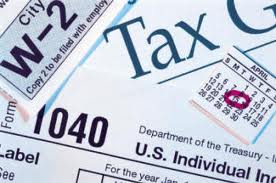 In the final weeks before the federal tax return filing deadline, consumers are searching for the best ways to file their taxes fast and free, but to help them avoid potential tax scams one agency is offering some important tax tips. The California Tax Education Council (CTEC) has released 3 key steps to take, to ensure that your tax preparer is legal and qualified to file your income taxes, and to help you avoid getting ripped-off.
In the final weeks before the federal tax return filing deadline, consumers are searching for the best ways to file their taxes fast and free, but to help them avoid potential tax scams one agency is offering some important tax tips. The California Tax Education Council (CTEC) has released 3 key steps to take, to ensure that your tax preparer is legal and qualified to file your income taxes, and to help you avoid getting ripped-off.
The CTEC is a nonprofit organization established in 1997 by the California State Legislature to protect taxpayers against fraud and incompetent tax preparers. The agency stresses the importance of understanding that just because a tax preparer has a business office or an accounting degree does not necessarily mean that the tax preparer is actually legal.
Here are the 3 steps you can take to make sure that your tax preparer is legal:
1 – Under California law, an individual who charges a fee for tax preparation and filing is required to be either an attorney, certified public accountant (CPA), IRS enrolled agent (EA), or registered tax preparer with the California Tax Education Council (CTEC). Without any of these qualifications, the individual could face penalties up to $5,000 from the Franchise Tax Board. You can report unregistered tax preparers by calling (877) 850-CTEC.
2 –Like you should do before hiring anyone, a check of the tax preparer’s business history, including any consumer complaints is critical to help avoid any potential tax scams. To research their background, the following resources are a good place to start:
•Attorneys, California State Bar
Visit www.calbar.ca.gov
•Certified Public Accountants (CPAs), California Board of Accountancy
Visit www.dca.ca.gov/cba
•CTEC Registered Tax Preparers (CRTPs), California Tax Education Council
Visit www.ctec.org
•Enrolled Agents (EAs), California Society of Enrolled Agents
Visit www.csea.org or email the IRS at opr@irs.gov.
3 – In 2011, the IRS started requiring all paid tax preparers to register for Preparer Tax Identification Number (PTIN). These PTIN must now be included on each federal tax return prepared and signed by the preparer. If the person preparing your taxes does not have this PTIN, the CTEC recommends that you select another tax preparation service immediately.
![Herbal Reference Substances are Key to Everyday Products <!-- AddThis Sharing Buttons above -->
<div class="addthis_toolbox addthis_default_style " addthis:url='http://newstaar.com/herbal-reference-substances-are-key-to-everyday-products/3512112/' >
<a class="addthis_button_facebook_like" fb:like:layout="button_count"></a>
<a class="addthis_button_tweet"></a>
<a class="addthis_button_pinterest_pinit"></a>
<a class="addthis_counter addthis_pill_style"></a>
</div>When it comes to quality control testing and the development of new products, Botanical Reference Materials (BRMs), also known as Herbal References are critically important. To help companies ultimately obtain all-important FDA approval, the Food and Drug Administration provides in its guidance a recommendation that […]<!-- AddThis Sharing Buttons below -->
<div class="addthis_toolbox addthis_default_style addthis_32x32_style" addthis:url='http://newstaar.com/herbal-reference-substances-are-key-to-everyday-products/3512112/' >
<a class="addthis_button_preferred_1"></a>
<a class="addthis_button_preferred_2"></a>
<a class="addthis_button_preferred_3"></a>
<a class="addthis_button_preferred_4"></a>
<a class="addthis_button_compact"></a>
<a class="addthis_counter addthis_bubble_style"></a>
</div>](http://newstaar.com/wp-content/uploads/2021/02/Achillea_millefolium_flowers-100x100.jpg)
![Quality Electrochemical Biosensors are Critical for Medical, Food and Chemical Industry <!-- AddThis Sharing Buttons above -->
<div class="addthis_toolbox addthis_default_style " addthis:url='http://newstaar.com/quality-electrochemical-biosensors-are-critical-for-medical-food-and-chemical-industry/3512086/' >
<a class="addthis_button_facebook_like" fb:like:layout="button_count"></a>
<a class="addthis_button_tweet"></a>
<a class="addthis_button_pinterest_pinit"></a>
<a class="addthis_counter addthis_pill_style"></a>
</div>A number of industries have, at their core, a need to frequent or even continuous analysis of biological media. These include the medical and pharmaceutical fields, biotech firms, and food and chemical companies. To maintain quality standards and develop new products, these industries rely heavily […]<!-- AddThis Sharing Buttons below -->
<div class="addthis_toolbox addthis_default_style addthis_32x32_style" addthis:url='http://newstaar.com/quality-electrochemical-biosensors-are-critical-for-medical-food-and-chemical-industry/3512086/' >
<a class="addthis_button_preferred_1"></a>
<a class="addthis_button_preferred_2"></a>
<a class="addthis_button_preferred_3"></a>
<a class="addthis_button_preferred_4"></a>
<a class="addthis_button_compact"></a>
<a class="addthis_counter addthis_bubble_style"></a>
</div>](http://newstaar.com/wp-content/uploads/2020/10/Electrochemical-Biosensor-100x100.jpg)
![Company Develops Industrial Mixers Well-Suited for both Fragile and Explosive Products <!-- AddThis Sharing Buttons above -->
<div class="addthis_toolbox addthis_default_style " addthis:url='http://newstaar.com/company-develops-industrial-mixers-well-suited-for-both-fragile-and-explosive-products/3512071/' >
<a class="addthis_button_facebook_like" fb:like:layout="button_count"></a>
<a class="addthis_button_tweet"></a>
<a class="addthis_button_pinterest_pinit"></a>
<a class="addthis_counter addthis_pill_style"></a>
</div>Industrial drum mixers are normally applied to blend mixes of varying viscosities such as adhesive slurries or cement. Some of these mixers have the capability of blending mixes of very different particle sizes such as fruit and ice cream, and gravel and cement slurry. The […]<!-- AddThis Sharing Buttons below -->
<div class="addthis_toolbox addthis_default_style addthis_32x32_style" addthis:url='http://newstaar.com/company-develops-industrial-mixers-well-suited-for-both-fragile-and-explosive-products/3512071/' >
<a class="addthis_button_preferred_1"></a>
<a class="addthis_button_preferred_2"></a>
<a class="addthis_button_preferred_3"></a>
<a class="addthis_button_preferred_4"></a>
<a class="addthis_button_compact"></a>
<a class="addthis_counter addthis_bubble_style"></a>
</div>](http://newstaar.com/wp-content/uploads/2020/06/bandeau-sofragir2-100x100.jpg)